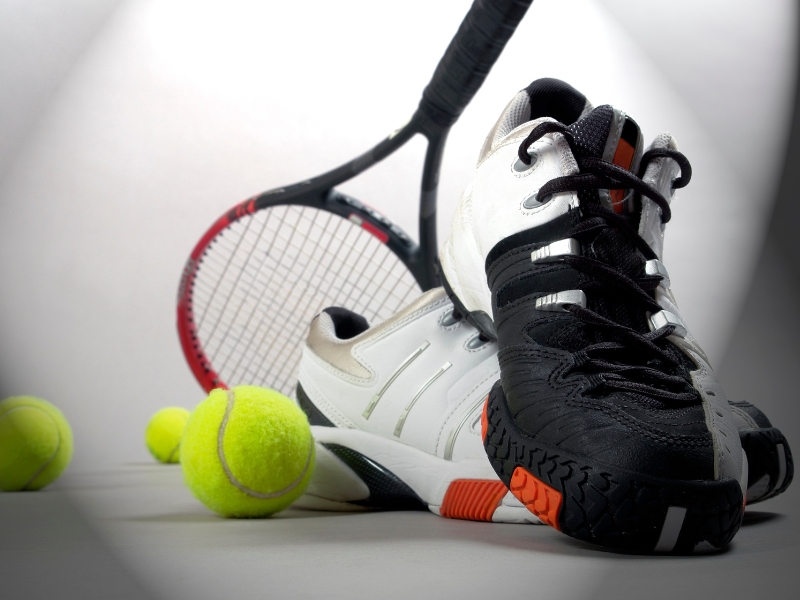
Welcome to our article on the Best Tennis Shoes for Achilles Tendonitis. Selecting the right footwear is crucial for tennis players, especially when dealing with Achilles Tendonitis. This condition demands shoes that offer the perfect blend of support, cushioning, and stability to mitigate discomfort and prevent further injury. In this guide, we delve into a curated selection of tennis shoes that are specifically designed to cater to the needs of players with Achilles Tendonitis. From innovative cushioning technologies to designs that ensure ankle stability and reduce heel strain, we’ve covered various models that promise to enhance your comfort and performance on the court. Whether you’re a professional athlete or a recreational player, finding the right shoe can significantly impact your game and overall foot health. Join us as we explore the top choices that can help you play your best game while protecting your Achilles tendon.
Table of Contents
- 1 Quick Answer
- 2 Our Top Picks
- 3 Best Tennis Shoes For Achilles Tendonitis
- 4 What is Achilles Tendonitis?
- 5 What Causes of Achilles Tendonitis?
- 6 Some Methods To Prevent Achilles Tendinitis
- 7 Criteria for Choosing Tennis Shoes for Achilles Tendonitis
- 8 Benefits of Wearing the Right Tennis Shoes
- 9 Why Trust Our Reviews?
Quick Answer
Name of products | Asics Court FF3 | Adidas SoleCourt Boost | Asics Gel Resolution 8 |
Product image | 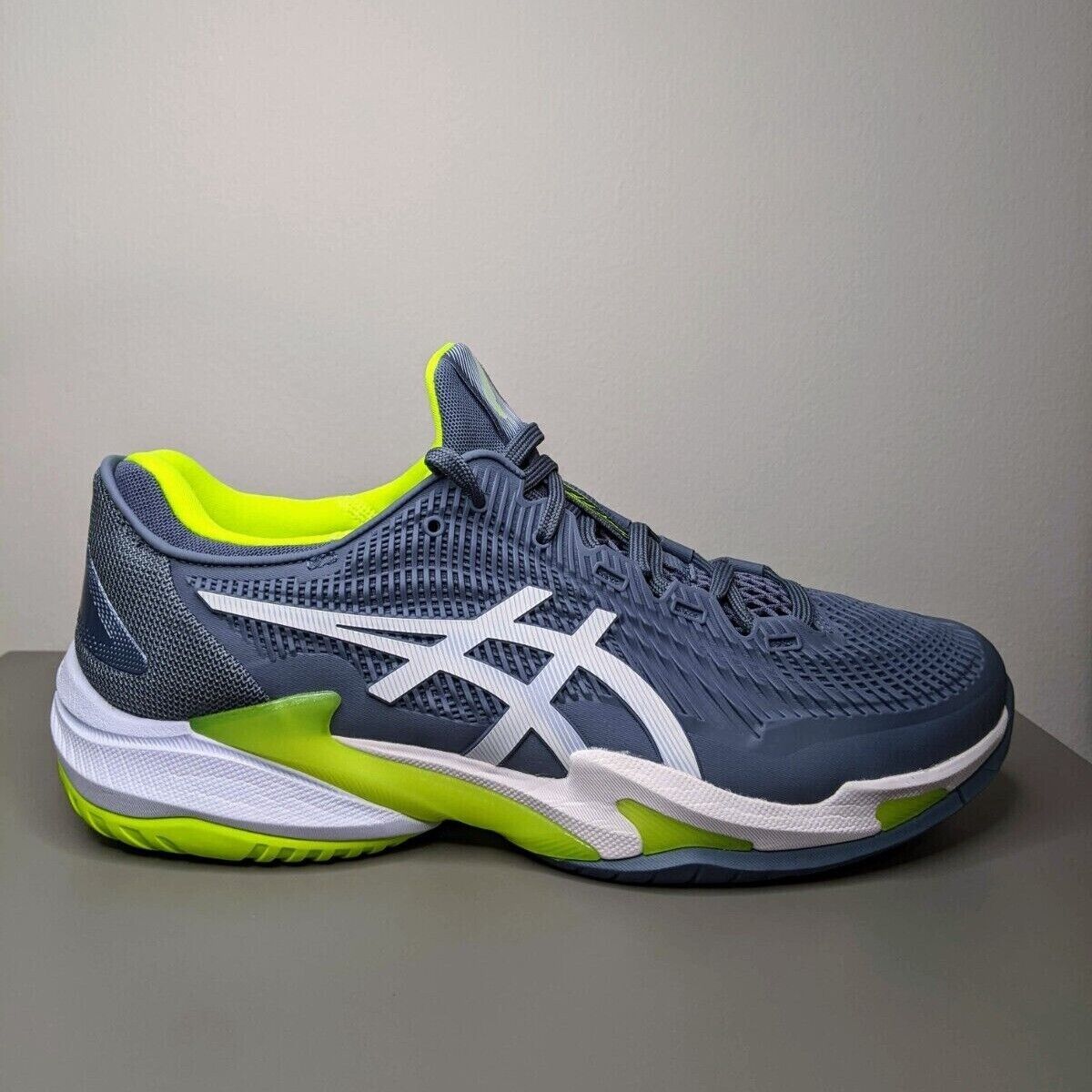 | 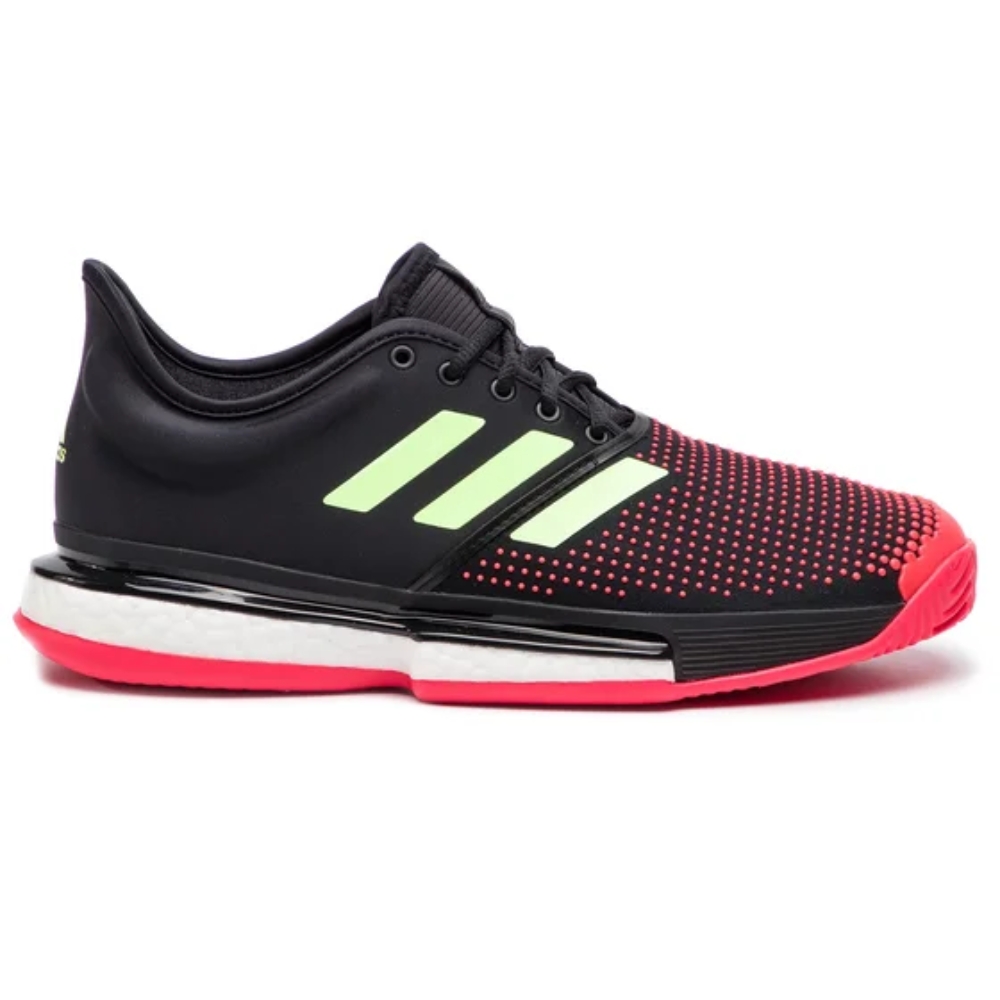 | 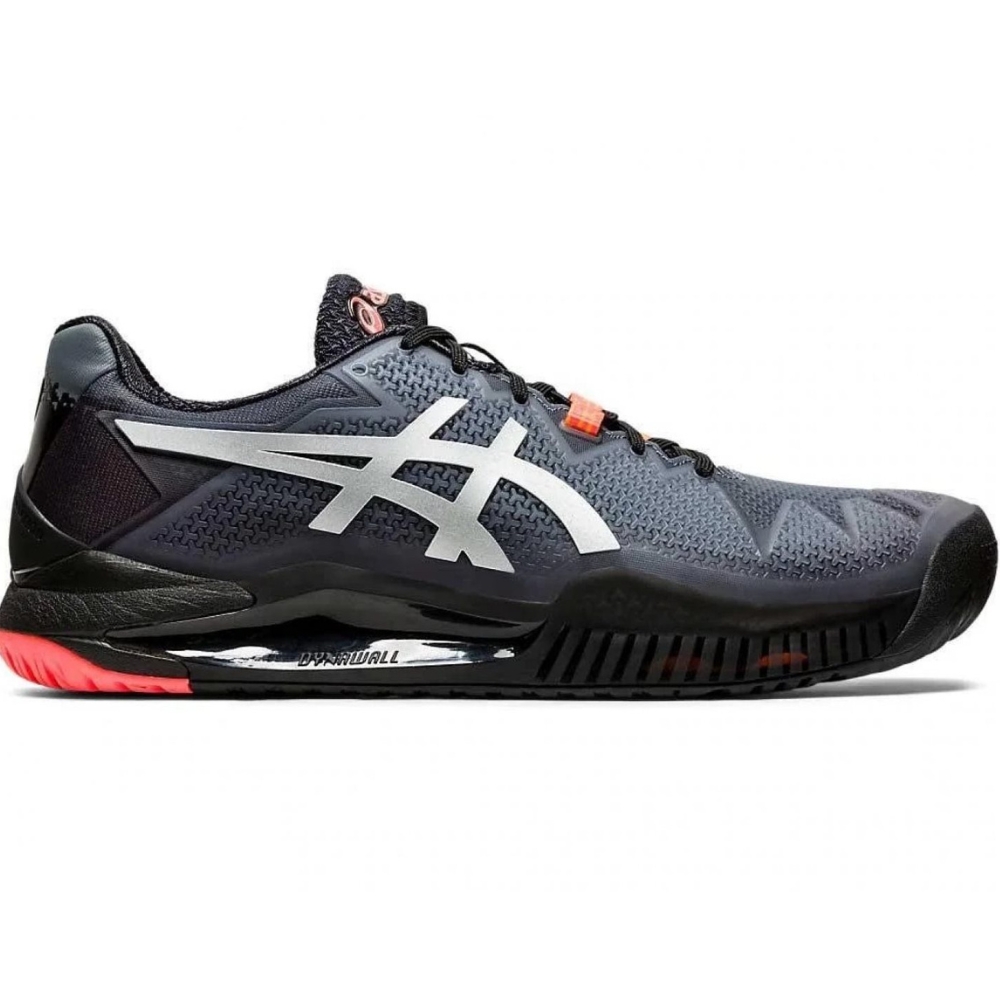 |
Advantages |
|
|
|
Buy Here | |||
Rated by our team |
Our Top Picks
Asics Court FF3 – Best Overall
Adidas SoleCourt Boost – Best Choice
Asics Gel Resolution 8 – Best Comprehensive
Yonex Power Cushion Eclipsion 3 – Best Choice for Thin Feet
K-Swiss Ultrashot 3 – Best Comfortable
Diadora Speed Blushield 4 – Best Steady Traction
Nike Air Zoom Vapor X – Best Responsive Cushioning
Babolat Propulse Fury – Best Advanced
Wilson Rush Pro – Best Functionality
New Balance Fresh Foam Lav – Best Choice for Ultra Heel
Best Tennis Shoes For Achilles Tendonitis
Asics Court FF3

Our Rating: 10*
Details:
Key Features:
- Flexion Fit upper for adaptive support
- FlyteFoam midsole technology for responsive cushioning
- Rearfoot and Forefoot GEL Technology Cushioning System
Technical Characteristics:
- Sole: AHAR Outsole increases durability
- Weight: Approximately 12.3 ounces (size 10.5)
- Heel Height: 22mm
My experience:
Stepping into the Asics Court FF 3 felt transformative. Right off the bat, it was clear why they’re touted as one of the best tennis shoes for Achilles tendonitis. The unmatched support gave me confidence with every step, and the cloud-like cushioning eased my landings during heated rallies. The shoe’s excellent breathability ensured lasting comfort, but the standout feature was its heel design that reduced Achilles stress. The Asics Court FF 3 not only elevates performance but also offers paramount protection for the feet.
|
|
Adidas SoleCourt Boost

Rating: 9.9*
Details:
The Adidas SoleCourt Boost stands out as an exceptional tennis shoe for players with Achilles Tendonitis, providing unmatched support and energy return. At its core lies the revolutionary Boost midsole, renowned for its comfort and responsiveness, cushioning the foot during high-impact play. The shoe’s upper is reinforced with Adituff technology, offering excellent abrasion resistance in key areas. Stability is prioritized with a 3D Torsion system and a supportive TPU chassis that wraps around the foot, ensuring every step and pivot is secure. The outsole features durable Adiwear 6 rubber, offering longevity and traction on all court surfaces. Designed with an ergonomic heel shape, the SoleCourt Boost minimizes strain on the Achilles tendon, making it a top pick for serious players who require both protective features and dynamic performance.
Key Features:
- Boost midsole for energy-returning cushioning
- Adituff toe for abrasion resistance
- TPU chassis for stability and support
Technical Characteristics:
- Sole: Durable Adiwear 6 outsole
- Weight: Approximately 13.5 ounces (size 10.5)
- Heel Height: 21mm
My experience:
The Adidas SoleCourt Boost has been exceptional. The Boost midsole provides unparalleled comfort and energy return, crucial during long matches. The shoe’s stability and support are outstanding, giving me confidence in every movement, while the durable outsole offers great traction. Overall, it’s a top-performing tennis shoe that perfectly balances comfort and agility.
|
|
Asics Gel Resolution 8

Our Rating: 9.9*
Details:
The Asics Gel Resolution 8 tennis shoe is a top choice for athletes with Achilles Tendonitis, thanks to its emphasis on stability and comfort. This shoe incorporates Asics’ Gel technology, providing exceptional shock absorption in the rear and forefoot, crucial for reducing stress on the Achilles. The inclusion of Dynawall technology enhances midfoot security, allowing for confident lateral movements. The Flexion Fit upper delivers form-fitting support without sacrificing flexibility, while the PGuard Toe Protector extends the shoe’s longevity. The Gel Resolution 8’s outsole is crafted with AHAR+ material, offering increased abrasion resistance and traction. With a focus on providing a stable base while maintaining a comfortable fit, this shoe is designed to meet the rigorous demands of high-level tennis play, protecting the Achilles without compromising on athletic performance.
Key Features:
- Dynawall technology for added midfoot stability
- PGuard Toe Protector for enhanced toe durability
- GEL cushioning system for shock absorption
Technical Characteristics:
- Sole: AHAR Plus Outsole for extra durability
- Weight: Approximately 13.8 ounces (size 10.5)
- Heel Height: 20mm
|
|
Yonex Power Cushion Eclipsion 3
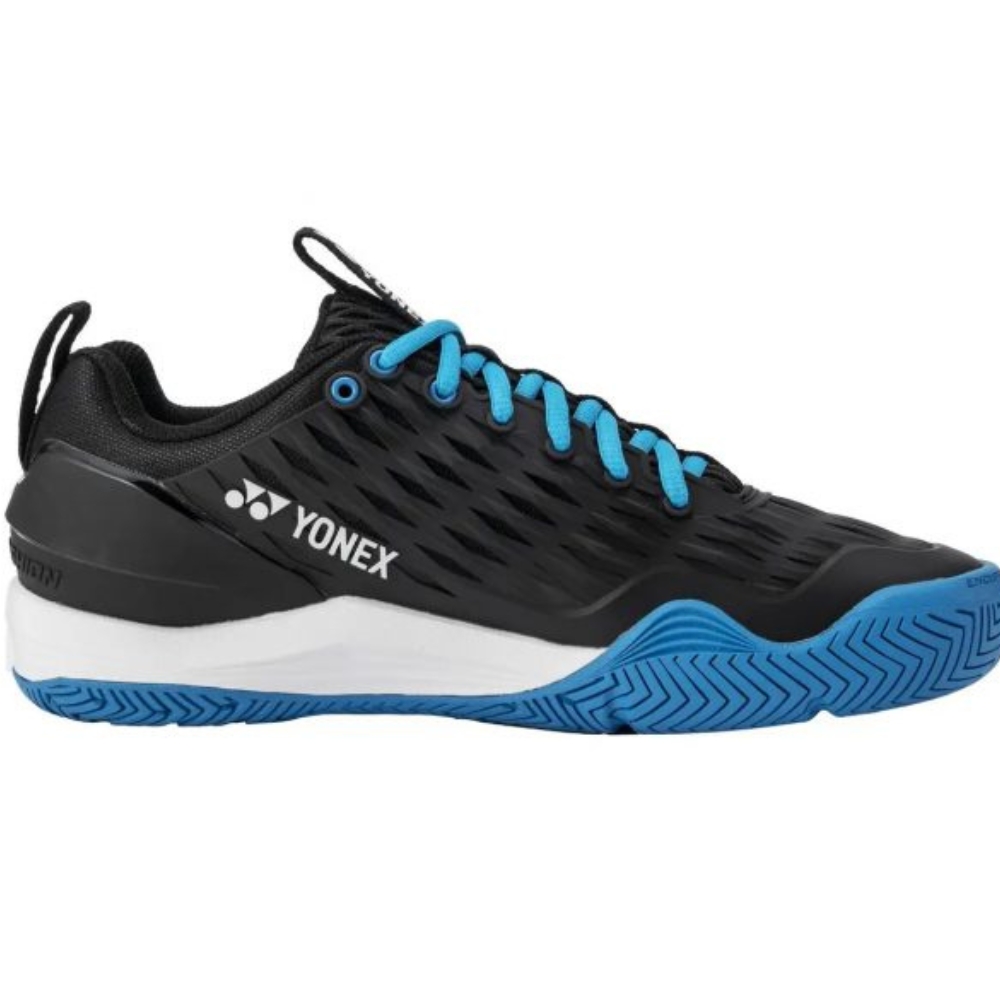
Rating: 9.8*
Details:
The Yonex Power Cushion Eclipsion 3 is meticulously crafted to cater to tennis players with concerns such as Achilles Tendonitis. It boasts Yonex’s signature Power Cushion technology, which excels in absorbing shock and then reversing the impact energy for smooth transfer into the next movement. This shoe enhances stability with a sturdy yet comfortable fit, providing secure ankle support that’s vital for protecting the Achilles tendon. Its durable skin and re-engineered rubber outsole ensure long-lasting wear and superior traction on court surfaces. The Eclipsion 3’s design doesn’t just stop at functional excellence; it also delivers on aesthetics with a sleek, athletic look that complements its performance features. It is a shoe that promises to elevate a player’s game while offering the protective cushioning needed for those with Achilles sensitivities.
Key Features:
- Power Cushion+ for improved shock absorption
- Endurance Rubber outsole for grip and durability
- Durable Skin for robust support
Technical Characteristics:
- Sole: Round Sole for all-around support
- Weight: Approximately 12.5 ounces (size 10.5)
- Heel Height: 22mm
|
|
K-Swiss Ultrashot 3
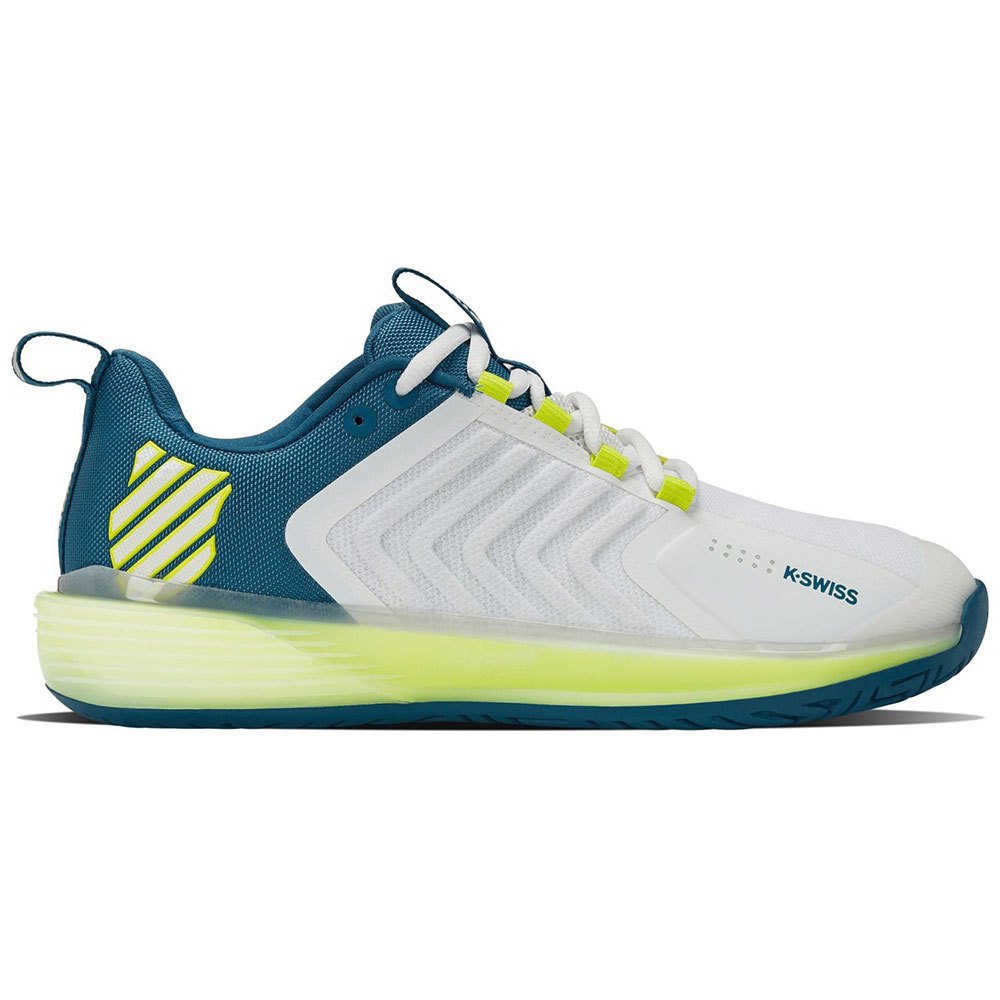
Our Rating: 9.8*
Details:
The K-Swiss Ultrashot 3 is engineered with the high-performance athlete in mind, offering features that cater to those with Achilles Tendonitis. This shoe delivers exceptional durability without compromising on comfort, thanks to its DragGuard 7.0 and DuraWrap technologies, which provide extra protection in high-wear areas. The Aösta 7.0 high-density rubber outsole ensures longevity and superior traction across court surfaces. The Ultrashot 3’s midsole is equipped with Surgelite technology, a lightweight, high-rebound material that offers excellent energy return and cushioning, reducing the impact on the Achilles tendon. Its Ortholite x40 sock liner enhances cushioning and breathability, ensuring a comfortable fit throughout the game. With a focus on stability and support, the K-Swiss Ultrashot 3 is designed to meet the demands of competitive play while safeguarding against common foot ailments.
Key Features:
- DragGuard 7.0 for enhanced toe durability
- Surge 7.0 midsole for maximum energy return
- Aösta 7.0 high-density outsole for durability
Technical Characteristics:
- Sole: Non-marking herringbone tread
- Weight: Approximately 15 ounces (size 10.5)
- Heel Height: 24mm
|
|
Diadora Speed Blushield 4
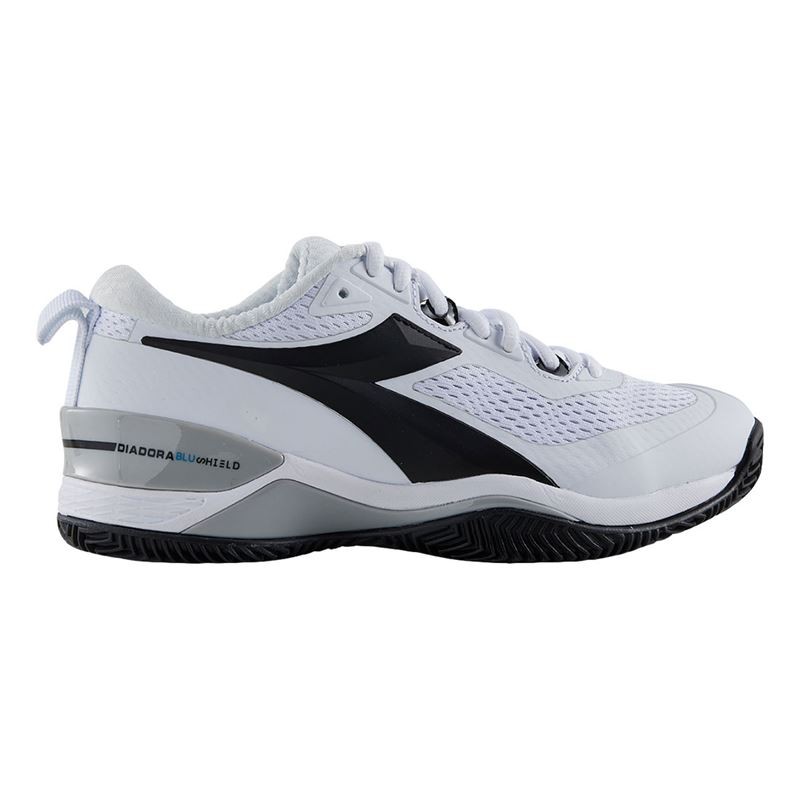
Rating: 9.8*
Details:
The Diadora Speed Blushield 4 is a cutting-edge tennis shoe designed to offer superior comfort and support for players with Achilles Tendonitis. It incorporates Diadora’s innovative Blushield technology, which merges cushioning and responsiveness to minimize impact on the Achilles with each stride. The shoe’s outsole features a wear-resistant Duratech 5000 compound, providing durability and excellent traction on the court. An Ortholite insole is included for additional cushioning and ergonomic comfort, adapting to the foot’s shape. The Speed Blushield 4 also boasts a Supreltech + Air mesh + D-Skin upper for breathability and stability, ensuring a secure fit without sacrificing airflow. Its sleek design and robust construction make it an ideal choice for tennis players seeking a shoe that delivers both in performance and protection.
Key Features:
- Blushield technology for foot stability
- Duratech 5000 wear-resistant sole
- Ortholite insole for ergonomic comfort
Technical Characteristics:
- Sole: Modified herringbone pattern for traction
- Weight: Approximately 14.5 ounces (size 10.5)
- Heel Height: 19mm
|
|
Nike Air Zoom Vapor X
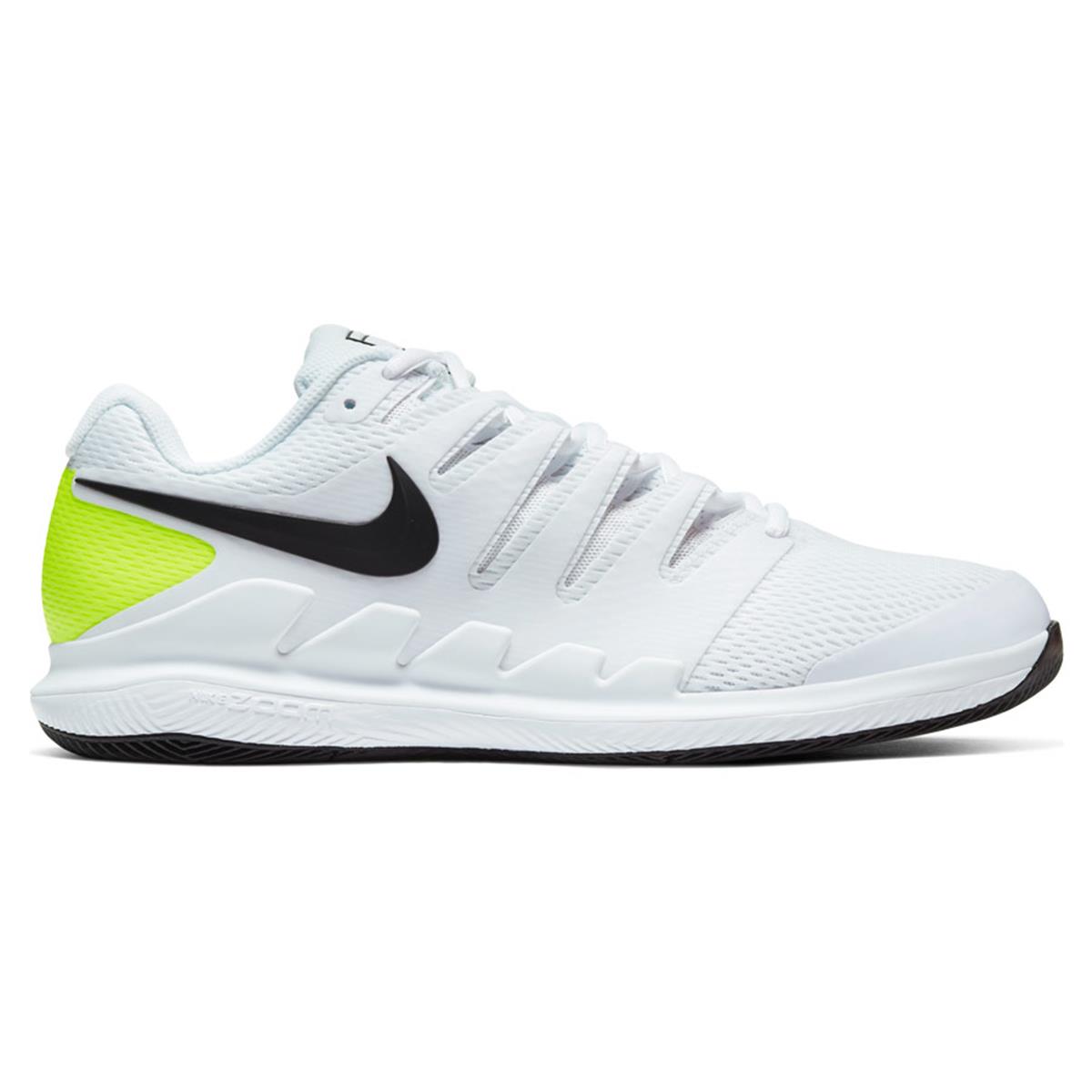
Rating: 9.7*
Details:
The Nike Air Zoom Vapor X is a premier choice for tennis players with Achilles Tendonitis due to its responsive cushioning and tailored fit. The shoe features Nike’s Zoom Air unit in the heel, providing a springy, responsive feel and helping to reduce stress on the Achilles during play. The Dynamic Fit system achieves a glove-like fit, wrapping the midfoot and arch for adaptive support. A TPU midfoot shank enhances lateral stability for quick direction changes while preserving the shoe’s structural integrity. The Vapor X’s outsole utilizes a herringbone pattern with XDR compound for durable traction on a variety of court surfaces. Lightweight and engineered for high-speed play, the Vapor X combines advanced technology with a sleek design to offer a shoe that supports vigorous movements without compromising on comfort or protection.
Key Features:
- Zoom Air unit in the heel for responsive cushioning
- Dynamic Fit system for a glove-like fit
- TPU midfoot shank for lateral support
Technical Characteristics:
- Sole: XDR rubber in a herringbone pattern for durability
- Weight: Approximately 13 ounces (size 10.5)
- Heel Height: 18mm
|
|
Babolat Propulse Fury
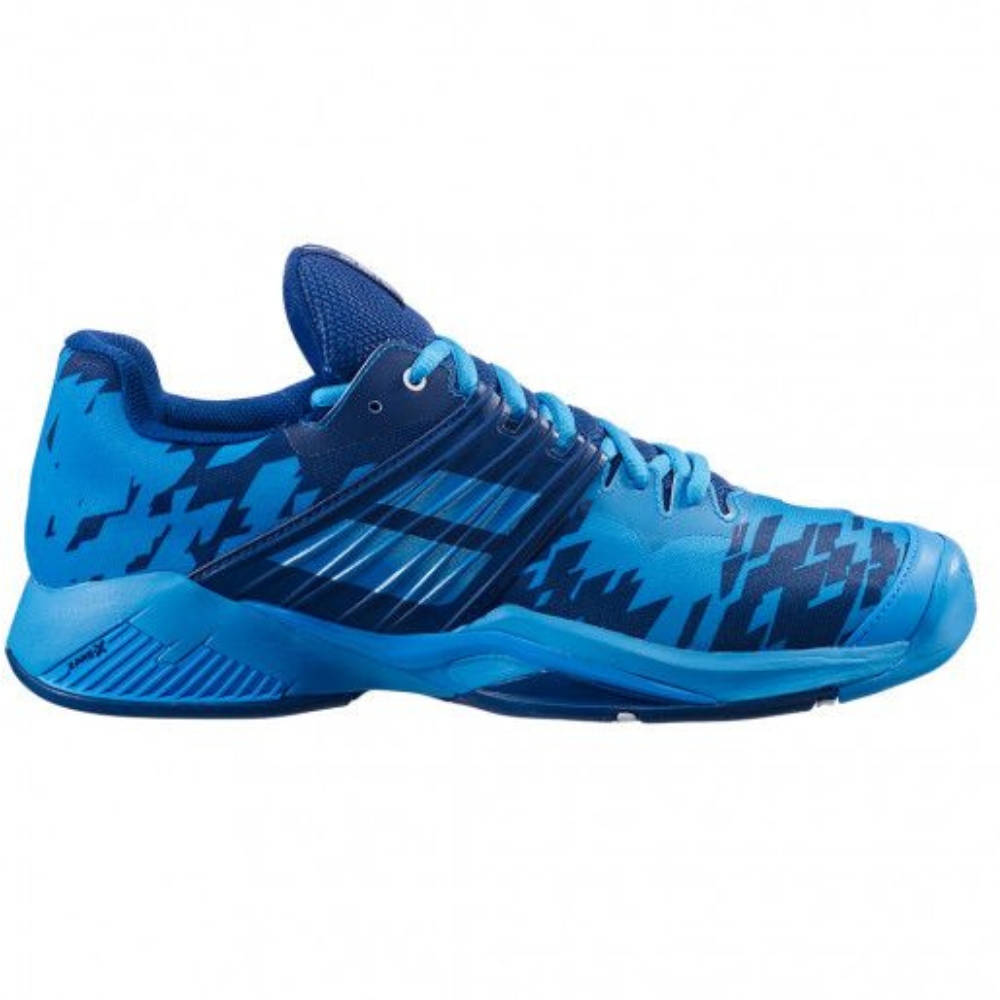
Rating: 9.7*
Details:
The Babolat Propulse Fury is a robust and supportive tennis shoe, tailor-made for players seeking extra ankle support and protection for conditions like Achilles Tendonitis. It is characterized by its Powerbelt, a unique strap that ensures optimal midfoot and heel lockdown, providing stability during intense lateral movements. The shoe integrates Babolat’s Kompressor System for long-lasting heel cushioning and shock absorption, essential for reducing Achilles strain. Additionally, the Michelin Performance outsole offers exceptional durability and traction, allowing players to move confidently on the court. The Propulse Fury is designed with an active Flexion sole construction, ensuring responsiveness in areas critical to tennis footwork. With its focus on safety and performance, this shoe is a testament to Babolat’s commitment to combining innovative technology with player-specific design.
Key Features:
- Powerbelt strap for secure lockdown
- Kompressor System for shock absorption
- Michelin Performance outsole for traction and durability
Technical Characteristics:
- Sole: Michelin OCS2 for optimal grip
- Weight: Approximately 14 ounces (size 10.5)
- Heel Height: 20mm
|
|
Wilson Rush Pro
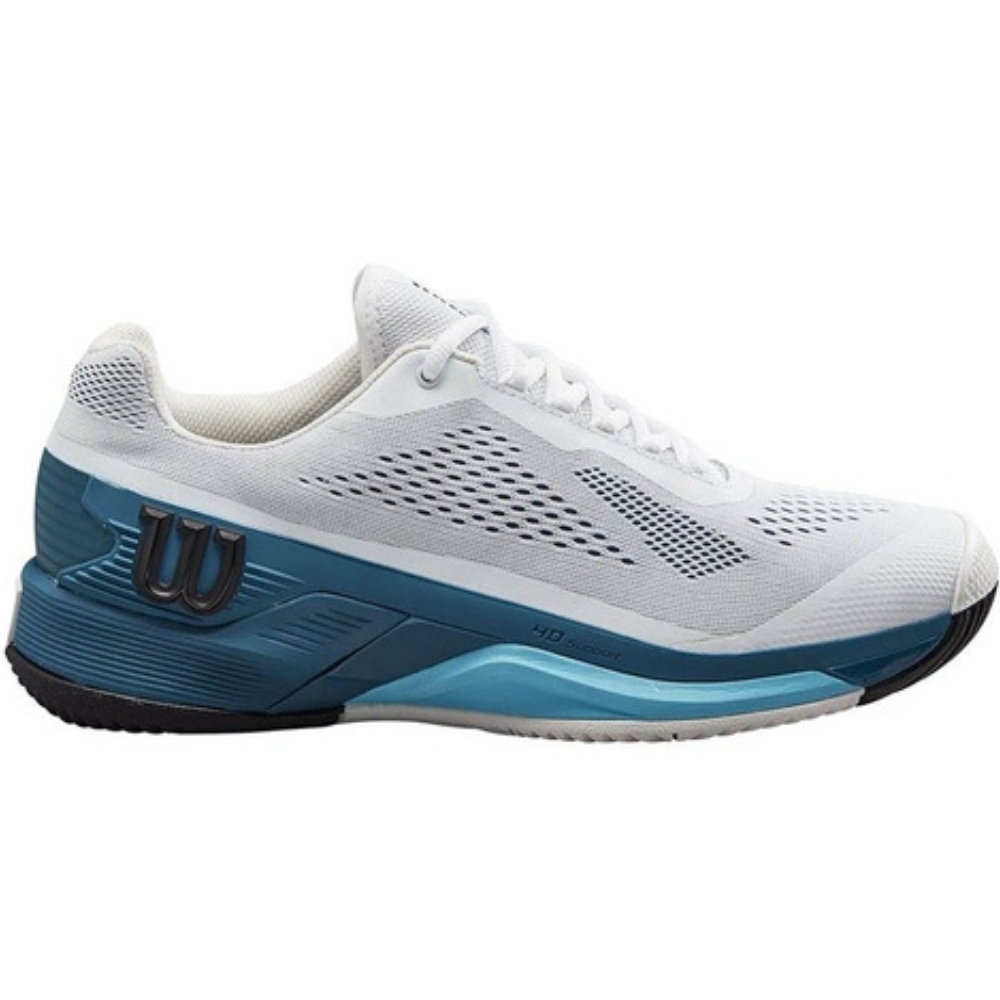
Rating: 9.6*
Details:
The Wilson Rush Pro is a high-performance tennis shoe designed to cater to players prone to Achilles Tendonitis. It features Sensifeel 2.0 technology, which enhances comfort while reducing weight, and a 4D Support Chassis that limits supination and torsion, providing stability and reducing the risk of injury. The Rush Pro’s R-DST+ offers exceptional cushioning and rebound in the midsole, delivering comfort and responsiveness during play. Designed with Duralast outsole, it ensures exceptional durability and traction on all court surfaces. The shoe’s overall construction focuses on maintaining a balance between providing support and ensuring flexibility, making it ideal for players who require a reliable shoe that can withstand the rigors of intense tennis matches while offering protection to sensitive areas like the Achilles tendon.
Key Features:
- Sensifeel 2.0 for reduced weight and enhanced comfort
- 4D Support Chassis limits supination and torsion
- R-DST+ for cushioning and rebound
Technical Characteristics:
- Sole: Duralast outsole for wear resistance
- Weight: Approximately 14 ounces (size 10.5)
- Heel Height: 20mm
|
|
New Balance Fresh Foam Lav
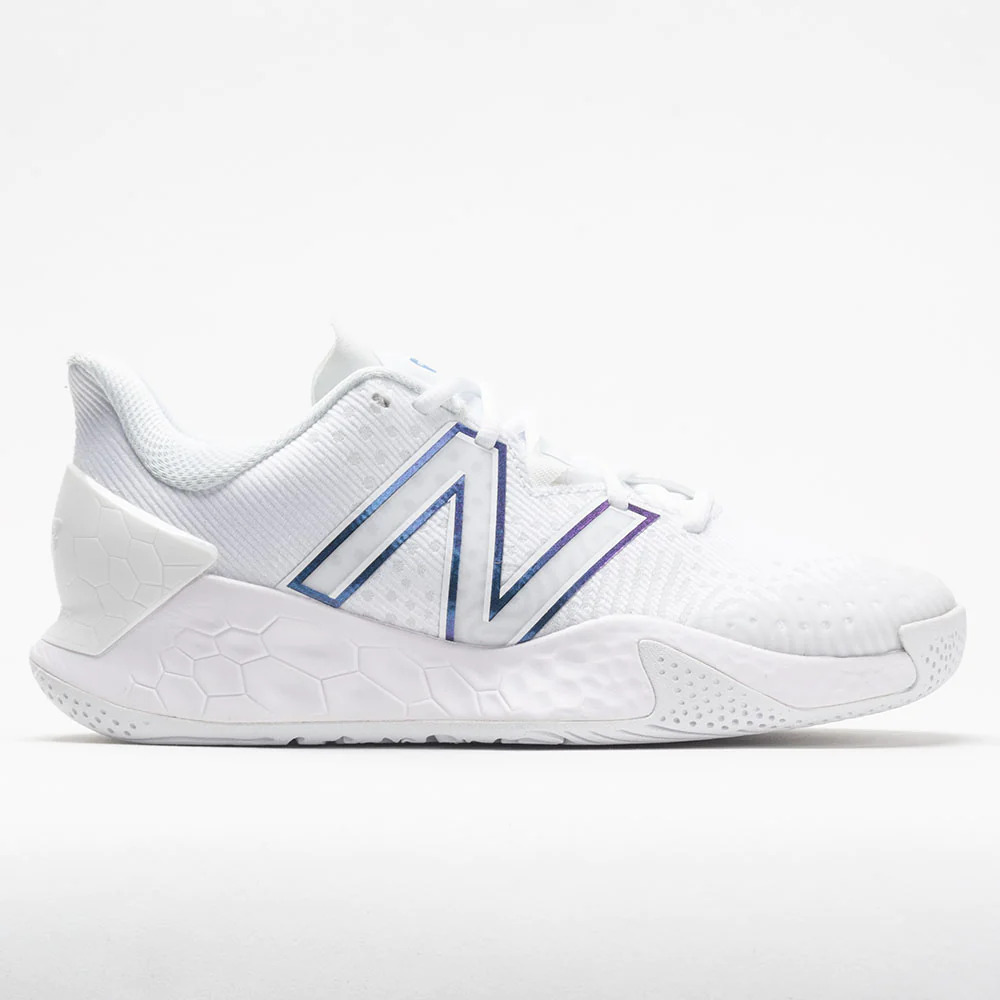
Rating: 9.6*
Details:
The New Balance Fresh Foam Lav is designed with the modern tennis player in mind, offering exceptional features for those with Achilles Tendonitis. It showcases New Balance’s signature Fresh Foam midsole, engineered for plush, precision cushioning that provides critical support and reduces strain on the Achilles. The shoe’s upper employs NDure technology for enhanced durability, ensuring it withstands the rigors of intense play. Kinetic Stitch construction adds to its flexibility and stability, accommodating dynamic movements while maintaining a secure fit. The Lav’s outsole is crafted with NDurance rubber, offering superior durability and traction on various court surfaces. This shoe, developed in collaboration with professional tennis player Milos Raonic, is noted for its blend of comfort, performance, and style, making it a top choice for players seeking footwear that supports rigorous athletic demands while protecting against injury.
Key Features:
- Fresh Foam midsole for plush cushioning
- NDure upper technology for durability
- Kinetic Stitch construction for flexibility
Technical Characteristics:
- Sole: NDurance rubber outsole for durability
- Weight: Approximately 14.4 ounces (size 10.5)
- Heel Height: 24mm
|
|
What is Achilles Tendonitis?
Achilles tendonitis is an overuse injury affecting the Achilles tendon. This crucial tendon serves as the connecting tissue linking the calf muscles at the back of the lower leg to the heel bone. Its primary role is to facilitate foot and ankle movements, but when subjected to excessive strain, it can become inflamed, leading to the condition known as Achilles tendonitis.
What Causes of Achilles Tendonitis?
Achilles Tendonitis is an inflammation of the Achilles tendon, the thick band of tissue connecting the calf muscles to the heel bone. Several factors contribute to the development of this condition:
- Overuse: Repetitive or intense strain on the Achilles tendon can cause microtears. Activities such as running, jumping, and sudden accelerations or decelerations are frequent culprits.
- Improper Footwear: Wearing shoes without adequate support, especially during high-impact activities, can place undue stress on the Achilles tendon.
- Physical Demands of Sports: Certain sports, like tennis, demand rapid changes in direction and intense jumping. This can overburden the Achilles tendon, making athletes more susceptible to tendonitis.
- Anatomical Conditions: Individuals with flat feet, when walking, might exert more pressure on the Achilles tendon. This could lead to tendonitis.
- Tight or Weak Calf Muscles: If calf muscles are tight, they can exert additional strain on the Achilles tendon. If they’re weak, other muscles and tendons, including the Achilles, might have to bear extra load.
By being aware of these causes, one can take steps to minimize risk factors and adopt practices that promote tendon health.
Some Methods To Prevent Achilles Tendinitis
- Focus on calf stretches to improve flexibility in the Achilles tendon. A limber tendon is less likely to suffer from microtears.
- Wear shoes with good arch support and cushioning. If you’re an athlete, ensure your sports shoes are appropriate for your activity and are replaced when worn out.
- Extra weight can strain the Achilles tendon. Keeping within a healthy weight range reduces this undue pressure.
- Always warm up with light activities before diving into your main exercise regimen.
- If you start to feel pain around the Achilles tendon, it’s a signal to rest. Ignoring the signs and pushing through can lead to more serious injuries.
- If you have flat feet or high arches, consider custom orthotics. They can help in distributing pressure more evenly when you walk or run.
Criteria for Choosing Tennis Shoes for Achilles Tendonitis
Support and Stability:
For those battling Achilles tendonitis, the support offered by tennis shoes is crucial. A sturdy heel counter combined with a strong midfoot shank minimizes excessive foot rotation, ensuring stability during rapid court movements. This stability is essential to avoid further stress on the sensitive Achilles tendon.
Cushioning and Comfort:
Adequate heel cushioning is a necessity for those with Achilles tendonitis. The heel cushion can absorb the shock during play, minimizing the impact on the tendon. Beyond the heel, the overall comfort of the shoe is essential, as discomfort can alter gait and movement patterns, potentially leading to further issues.
Material and Breathability:
The materials used in tennis shoes have a direct influence on their durability, comfort, and breathability. Lightweight, high-quality materials that allow for sufficient air circulation can prevent the feet from overheating, reducing swelling and discomfort. Materials like mesh are often recommended for optimal breathability.
Sole and Arch Design:
The design of the sole and arch is crucial for Achilles tendonitis sufferers. Shoes should have a sole that provides both grip on the court and flexibility for natural foot movements. The arch design is equally important, especially for those with specific foot shapes like high arches or flat feet. Proper arch support can alleviate unnecessary pressure on the Achilles tendon, helping to reduce pain and discomfort.
By taking these criteria into account when selecting tennis shoes, individuals with Achilles tendonitis can find footwear that not only enhances their performance but also prioritizes their health and well-being. Here are some of the best tennis shoes for Achilles Tendonitis that I have personally tried and recommend.
Benefits of Wearing the Right Tennis Shoes
Reduction of Pain and Discomfort:
Wearing the appropriate tennis shoes can significantly diminish foot and joint discomfort. The right shoes offer a combination of cushioning, arch support, and stability, ensuring that the foot aligns correctly and absorbs shocks efficiently. This prevents undue stress on the foot, ankle, and even the knees, thereby minimizing pain and providing a comfortable playing experience.
Enhanced Performance:
The right tennis shoes can greatly impact a player’s game. Proper footwear provides the grip needed for quick lateral movements, the stability for powerful serves, and the comfort for enduring longer matches. With the right traction and fit, players can move confidently, ensuring swift responses and optimal play.
Prevention of Further Injuries:
Tennis requires swift changes in direction, sudden stops, and quick accelerations. Wearing the correct shoes safeguards against potential injuries by providing the necessary ankle support and reducing the risk of foot roll. Moreover, the right shoes can also prevent overuse injuries, as they distribute pressure evenly across the foot, reducing the risk of stress-related injuries to the tendons or bones.
Why Trust Our Reviews?
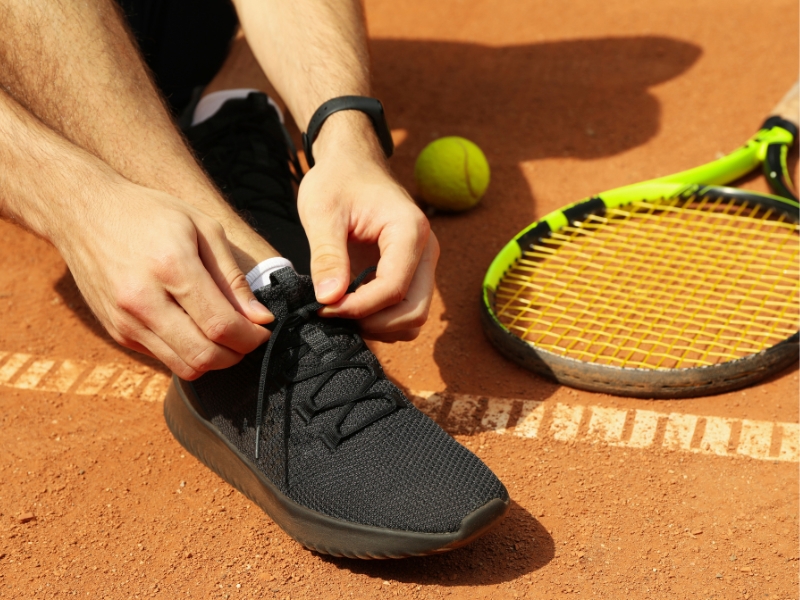
When it comes to tennis shoes for Achilles tendonitis, making the right choice is paramount for both performance and health. Our recommendations are based on in-depth research, comprehensive analysis, and the understanding of the unique requirements of those suffering from Achilles tendonitis. We dive deep into shoe technologies, cushioning systems, and stability features to ensure the selections offer optimal support and comfort. Our goal is to provide you with the most reliable and up-to-date information, so you can play with confidence, knowing that you’re wearing shoes that not only boost your game but also prioritize your well-being. Your trust is our top priority, and we strive to provide the most accurate and beneficial insights in the realm of tennis footwear.
Frequently Asked Questions
What’s the main cause of Achilles tendonitis in tennis players?
The main cause of Achilles tendonitis in tennis players is repetitive stress on the tendon from constant running, abrupt stops, and quick direction changes. Poor footwear, insufficient warm-ups, and sudden increases in playing intensity also contribute. Over time, this repetitive strain can cause microtears, leading to inflammation and pain in the Achilles tendon.
Can I continue playing tennis with Achilles tendonitis?
If you have Achilles tendonitis and wish to continue playing tennis, always consult a physician first. Wear supportive tennis shoes and prioritize warming up with calf stretches. Consider modifying your play, like choosing doubles over singles. After playing, apply the R.I.C.E method (Rest, Ice, Compress, Elevate). Listen to your body and halt if pain persists.
How long does recovery from Achilles tendonitis typically take?
Recovery from Achilles tendonitis varies based on severity, but mild cases often improve within 2-6 weeks with rest, physical therapy, and anti-inflammatory measures. More chronic or severe cases might take several months. Adhering to a physician-guided treatment plan and avoiding re-injury are crucial for optimal recovery. It’s essential to consult a healthcare professional for personalized advice.
Are there specific shoe brands recommended for Achilles tendonitis?
Yes, specific shoe brands cater to Achilles tendonitis by offering greater heel support and cushioning. Brands like ASICS, New Balance, and Brooks have models designed for optimal foot support and shock absorption. However, individual fit and comfort are paramount, so trying on multiple brands and consulting a podiatrist or physical therapist for recommendations is crucial.
Is surgery required for Achilles tendonitis?
Surgery is rarely required for Achilles tendonitis. Most cases respond to conservative treatments like rest, physical therapy, and anti-inflammatory medications. However, in persistent or severe cases where conservative measures fail, surgical intervention might be considered. It’s essential to consult a healthcare professional to determine the best treatment approach for individual circumstances.

I’m Heorhii Rysak, a go-to sports enthusiast and blogger. My fascination with sports began in my childhood with karate, setting the foundation for my love of physical fitness. Over the years, I’ve delved into various disciplines, including martial arts and CrossFit, and developed a passion for tennis. I bring a wealth of practical experience to my blog, where I share equipment reviews, workout plans, and fitness advice. My goal is simple: to inspire and assist you in your journey toward better health and performance.